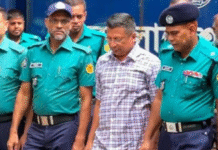Eight charges out of total 16, brought against the al-Badr chief were proved, the International Crimes Tribunal-1 pronounces
Jamaat-e-Islami Ameer Motiur Rahman Nizami has been sentenced to death for committing crimes against humanity during the 1971 Liberation War.
Justice M Enayetur Rahim, chairman of the three-member International Crimes Tribunal 1, delivered the much-delayed verdict at 12:20pm on Wednesday.
Other members of the tribunal are Justice Jahangir Hossain and Justice Anwarul Haque.
Eight charges out of total 16, which include conspiracy, planning, complicity, incitement and active participation were proved, the International Crimes Tribunal-1 pronounced.
The tribunal 1 has handed down war criminal Nizami death penalty on the charges of 2, 4, 6 and 16 while the Jamaat leader has been given life sentence on the charges of 1, 3, 7 and 8.
Earlier in the day, Nizami was taken to the tribunal around 9:25am and later he was kept in the tribunal lock-up.
At 11:10am, Justice M Enayetur Rahim, started reading out the summary of 204-page verdict.
This is the 10th verdict by the two war crimes tribunals.
On Tuesday, the International Crimes Tribunal 1 fixed the date to pronounce its verdict on Wednesday.
Nizami had been shifted to Dhaka Central Jail from Kashimpur around 8:30pm on Tuesday and his physical condition was well, Jail Superintendent Forman Ali told the Dhaka Tribune.
Earlier, the verdict in the case against the Jamaat top leader was postponed twice. In the latest on June 24, the verdict was postponed due to Nizami’s sickness.
Tight security measures have been taken in and around tribunal area as well as in the capital after announcement of the date.
An adequate number of uniformed and plainclothes police personnel have been kept deployed elsewhere in the capital to avert any untoward incident centring the verdict.
The trial against Nizami began on May 28, 2012.
He was arrested on July 29, 2010 on charges of hurting religious sentiments. After three days, he was shown arrested in a war crimes case.
On December 11, 2012, the prosecution brought 16 charges of crimes against humanity including conspiracy, planning, complicity, incitement and active participation against the Jamaat leader.
The charges against him included killing of 70 people and torching 72 houses in December 1971 at Brishalika village in Pabna’s Bera upazila; murdering 450 people in Demra and Baushia villages; killing of several people in front of a Hindu temple at Kormocha village of Santhia upazila as well as looting, rape and abduction.
As the head of East-Pakistan Islami Chhatra Sangha, then student wing of Jamaat, he led al-Badr group – a para militia force blamed for the systematic abduction and killing of intellectuals – until September, 1971.
Witness deposition in Nizmai’s case began in August, 2012 and ended in October last year with the testimony of Investigating Officer Abdur Razzak Khan, the 26th prosecution witness.
The defence produced four witnesses including son of the accused Md Nazibur Rahman.
Trial of the case ended in last November and the tribunal kept it for verdict.
But due to the retirement of the then tribunal chairman on December 31 before delivering the judgement, it was delayed by several more months.
In February, Justice Rahim was appointed and the two tribunals shuffled. The judge ordered fresh arguments in the case.
Source: Dhaka Tribune










